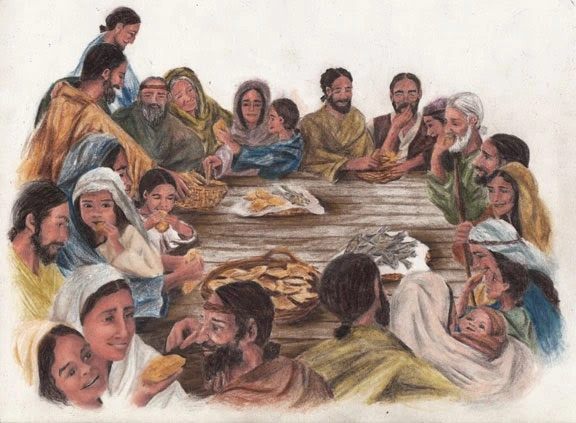LOVE LESSON: BENEFITS FROM THE EARLY CHURCH
THE SEED
“…and all that believed were together and had all things in common.” — Acts 2:44 (KJV)
The early Church was founded on a solid foundation of God’s love, reverence for Him, and genuine fellowship. The love expressed by the early believers was sincere, heartfelt, and evident in the way they lived and shared their lives. Scripture describes them as being united in love, practising mutual respect, and showing deep communal affection. Sharing became a natural expression of their faith, they gathered daily to study God’s Word and to share meals with gladness and simplicity of heart. As a result of this lifestyle, the Church flourished. Signs, wonders, and miracles became everyday occurrences, and these manifestations of God’s power drew many to salvation. What made this possible? The Word of God was not only taught but obeyed. The Apostles modelled a life of continuous praise and prayer. They boldly witnessed Christ, interceding for the lost and winning souls daily. The spiritual atmosphere they cultivated was conducive to divine visitation. This stands in stark contrast to some of the negative behaviours found in parts of today’s Church—such as gossip, selfishness, and greed. Yet, as members of the same Body of Christ, we are called to love and care for one another, recognising that when one part suffers, all are affected. Living out the God-kind of love, as demonstrated by the early Church, is a mandate for today’s Church. Our God is love, and we must reflect Him in how we treat others. As 1 John 2:6 reminds us, “He that saith he abideth in him ought himself also so to walk, even as he walked.” The apostles lived this out by bearing one another’s burdens. Galatians 6:2 urges us: “Bear ye one another’s burdens, and so fulfil the law of Christ.” That law is the law of love. When we seek out and meet the needs of our brethren, we are living out that love in action.
BIBLE READING: Acts 2:42–47
PRAYER: Father Lord, make me a channel of Your love. Help me to bring love where there is hatred, all for Your glory. In Jesus’ name. Amen.
ẸKỌ́ ÌFẸ́: ÀWỌN ÈRÈ LÁTI IJỌ ÀTẸ̀HÌNWÁ
IRUGBIN NAA
“…àti gbogbo àwọn tí ó gbàgbọ́ jọ wà, wọ́n sì ní ohun gbogbo papọ̀.” – Ìṣe 2:44 (KJV)
Ìjọ àtẹ̀hìnwá ní ìpìlẹ̀ tí ó dúró ṣinṣin lórí ìfẹ́ Ọlọ́run, ọ̀wọ̀ fún Un, àti ìdàpọ̀ tòótọ́. Ìfẹ́ tí àwọn onígbàgbọ́ àkọ́kọ́ fi hàn jẹ́ èyí tí ó jẹ́ òtítọ́, láti ọkàn wá, ó sì hàn nínú ọ̀nà tí wọ́n gbé ìgbé ayé wọn tí wọ́n sì pín èyí pẹ̀lú ara wọn. Ìwé Mímọ́ ṣàpèjúwe wọn gẹ́gẹ́ bí ẹni tí a so ní ọ̀kan nípa ìfẹ́, tí wọ́n ń ṣe ìbọ̀wọ̀ fún ara wọn, tí wọ́n sì ń fi ìfẹ́ agbègbè tí ó jinlẹ̀ hàn. Pípín owó àti ọrọ̀ di ọ̀nà ìfarahàn ìgbàgbọ́ wọn tí ó jẹ́ àbájáde, wọ́n kó ara wọn jọ lójoojúmọ́ láti kọ́ Ọ̀rọ̀ Ọlọ́run àti láti pín oúnjẹ pẹ̀lú ayọ̀ àti ìrọ̀rùn ọkàn. Ní àbájáde irú ìgbé ayé báyìí, Ìjọ gbèrú. Àwọn àmì, ìyanu, àti iṣẹ́ ìyanu di ohun tí ó ń ṣẹlẹ̀ lójoojúmọ́, àwọn ìfarahàn agbára Ọlọ́run wọ̀nyí sì fa ọ̀pọ̀lọpọ̀ wá sí ìgbàlà. Kí ló mú èyí ṣeéṣe? A kò kàn kọ́ Ọ̀rọ̀ Ọlọ́run nìkan ṣùgbọ́n a tẹríba fún un. Àwọn Àpósítélì ṣe àpẹẹrẹ ìgbé ayé ìyìn àti àdúrà tí kò lópin. Wọ́n jẹ́rìí Krístì pẹ̀lú ìgboyà, wọ́n ń bẹ̀bẹ̀ fún àwọn tí ó sọnù wọ́n sì ń wọ ọkàn lójoojúmọ́. Ipò ẹ̀mí tí wọ́n dá rọrùn fún àbẹ̀wò Ọlọ́run. Èyí jẹ́ ìdojúkọ pátápátá sí àwọn ìwà tí kò dára tí a rí nínú àwọn apá kan nínú Ìjọ òní— bíi òfófó, ìwà ìfẹ́ ara ẹni nìkan, àti oju kokoro. Síbẹ̀síbẹ̀, gẹ́gẹ́ bí àwọn ẹ̀yà Ara Krístì kan náà, a ní ípè láti fẹ́ràn ara wa kí a sì ṣe ìtọ́jú ara wa, kí a sì mọ̀ pé nígbà tí ẹ̀yà kan bá jìyà, gbogbo ara ni ó jẹ nípa re. Gbígbé ìgbé ayé irú ìfẹ́ Ọlọ́run, gẹ́gẹ́ bí Ìjọ àtẹ̀hìnwá ti fi hàn, jẹ́ àṣẹ fún Ìjọ òní. Ọlọ́run wa jẹ́ ìfẹ́, a sì gbọ́dọ̀ fi Í hàn nínú bí a ṣe ń tọ́jú àwọn ẹlòmíràn. Bí 1 Jòhánù 2:6 ti rán wa létí, “Ẹnìkan tí ó bá wí pé òun ń gbé inú rẹ̀ ó yẹ kí òun náà máa rìn bí ó ti rìn.” Àwọn àpósítélì gbé èyí jáde nípasẹ̀ rírù àwọn ẹrù ara wọn. Galatia 6:2 gba wa níyànjú: “Ẹ máa ru ẹrù ara yín, bẹ́ẹ̀ ni kí ẹ̀yin parí òfin Krístì.” Òfin náà ni òfin ìfẹ́. Nígbà tí a bá ń wá tí a sì ń pèsè fún àwọn àìní àwọn arákùnrin wa, a ń gbe ìfẹ́ náà jáde ní ìṣe.
BIBELI KIKA: Ìṣe awon aposteli 2:42-47.
ADURA: Bàbá Olúwa, ṣe mi ní ọ̀nà ìfẹ́ Rẹ. Ràn mí lọ́wọ́ láti mú ìfẹ́ wá sí ibití ìkórira wà, fún ògo Rẹ. Ní orúkọ Jésù. Àmín.
